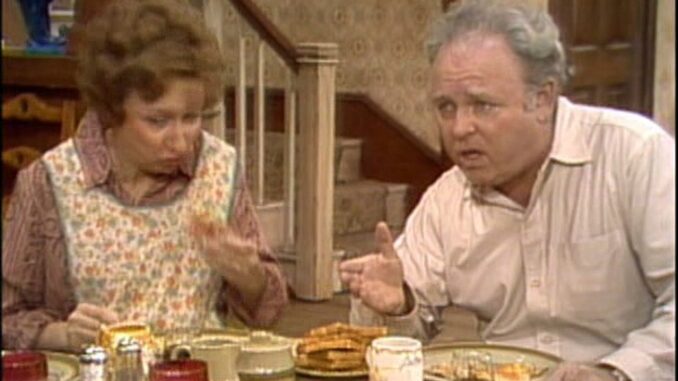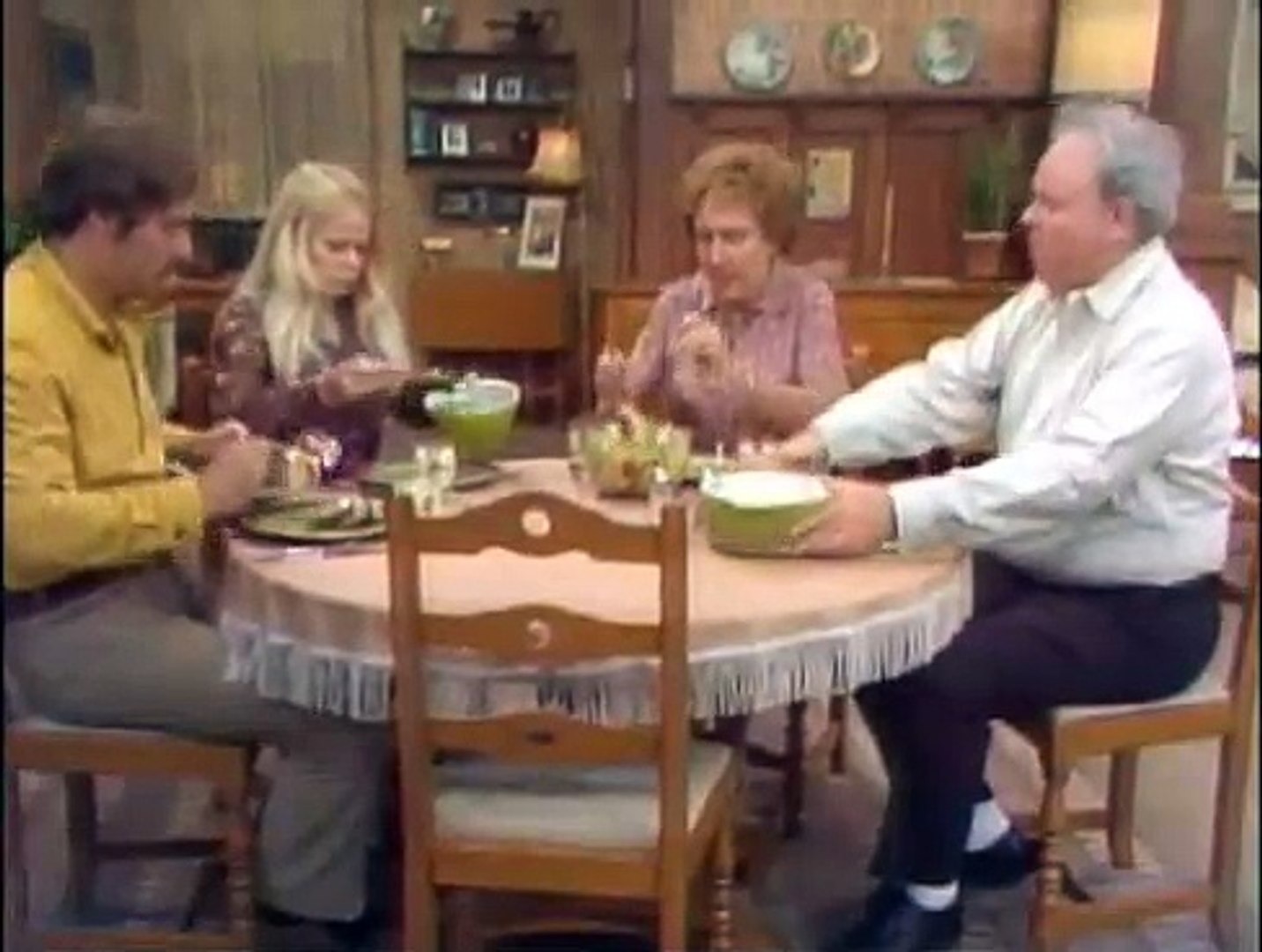
 All in the Family debuted on CBS on January 12, 1971, and it hit the ground running. The Norman Lear-created sitcom about the Bunker family — including boorish everyman Archie Bunker (Carroll O’Connor), sweet wife Edith (Jean Stapleton), feisty daughter Gloria (Sally Struthers), and son-in-law Michael, a.k.a. Meathead (Rob Reiner) —finished its first season as the #34 show in the country, but jumped to number one in its second season — a spot it held on to for the following four seasons. The 1979 series finale was watched by over 40 million viewers, and to this day, the show is beloved both for its warm comedy and boldness in dealing with social issues. Given credentials like that, you might be surprised to hear that before the show reached such great heights, it shot three pilots — two of which never aired.
All in the Family debuted on CBS on January 12, 1971, and it hit the ground running. The Norman Lear-created sitcom about the Bunker family — including boorish everyman Archie Bunker (Carroll O’Connor), sweet wife Edith (Jean Stapleton), feisty daughter Gloria (Sally Struthers), and son-in-law Michael, a.k.a. Meathead (Rob Reiner) —finished its first season as the #34 show in the country, but jumped to number one in its second season — a spot it held on to for the following four seasons. The 1979 series finale was watched by over 40 million viewers, and to this day, the show is beloved both for its warm comedy and boldness in dealing with social issues. Given credentials like that, you might be surprised to hear that before the show reached such great heights, it shot three pilots — two of which never aired.
What happened in the unaired All in the Family pilots?
All three pilots worked from the same script — which was adapted from a British show called ‘Til Death Do Us Part. Lear bought the rights and originally approached Mickey Rooney for the lead role, but the actor passed, feeling the show was doomed to failure. Lear then recruited O’Connor to play the role of a character then named Archie Justice, on a show then known as Justice for All. The Justice for All pilot was shot in 1968, and though it included Stapleton in the role of Edith, the role of Gloria was handled by Kelly Jean Peters, while her husband (then called Richard) was played by Tim McIntire. Though it included the signature opening of Archie and Edith singing “Those Were the Days,” instead of showing the pair crooning, the credits show shots of New York City, ending at the Justices’ front door.
Lear presented Justice For All to ABC, who passed on picking up the show, but gave him an infusion of cash to shoot a new pilot. That show, called Those Were the Days, was filmed in early 1969, and again starred O’Connor and Stapleton — but Gloria had been recast with Candy Azzara, while her husband (now called Dickie), was played by Chip Oliver. This version included a different but similar version of opening credits with Archie and Edith singing — though this was shot before a live audience, who chuckle throughout.
Lear took his second pilot again to ABC, who once again passed. He then brought it to CBS, who said yes, but with a caveat: it was time to once again recast Gloria and Meathead. It turned out, third time was the charm with the Bunker young’uns — Struthers and Reiner’s pilot made it to air as the show’s debut episode, “Meet the Bunkers.” Though they weren’t the show’s top-billed stars, Reiner and Struthers ended up being what finally got the show to air — and were an essential part of the secret sauce that kept them on top for so long.
If you’re an old-school TV lover or simply someone who enjoys sitcom trivia, you’ve probably asked yourself this: “Why weren’t Rob Reiner and Sally Struthers in the very first episode of ‘All in the Family’?”
It’s a question that even hardcore fans forget to ask, but the answer tells an interesting story about the birth of one of the most controversial and groundbreaking sitcoms in American history.
Let’s take a deep dive into this fascinating behind-the-scenes mystery.
What Made ‘All in the Family’ So Groundbreaking?
Before we get into the missing stars, let’s set the scene.
When ‘All in the Family’ debuted in 1971, television would never be the same. Gone were the squeaky-clean family sitcoms of the 60s. Archie Bunker stomped onto the small screen, yelling about race, politics, religion—topics that no one dared to touch in primetime. And audiences were hooked.
But here’s the kicker: The show almost wasn’t the show we came to know and love.
The Mystery of the Missing Meathead and Gloria
So why exactly weren’t Rob Reiner (Meathead) and Sally Struthers (Gloria) in the pilot?
The answer is both surprising and completely normal for television history:
They simply hadn’t been cast yet.
The First Episode Was Actually… Not the First You Saw!
Wait, what? You read that right.
The pilot episode most fans know as the “first episode” wasn’t the first one filmed.
CBS actually passed on two earlier pilots for the show before picking it up. And guess what? Both of those early versions had different actors playing Archie’s daughter and son-in-law.
Let’s Break Down Those Early Pilots
Pilot 1: “Justice For All” (1968)
Yep, that’s the original name.
-
Archie was called “Archie Justice.”
-
The family’s last name was not Bunker.
-
The daughter, Gloria, was played by Kelly Jean Peters.
-
The son-in-law, Richard Dreyfuss—yes, that Richard Dreyfuss—read for the role of Mike but didn’t make the final cut.
Pilot 2: “Those Were the Days” (1969)
CBS liked the idea but wasn’t sold on the cast.
-
Carroll O’Connor and Jean Stapleton remained as Archie and Edith.
-
Gloria and Mike were played by completely different actors again.
It wasn’t until the third pilot—what finally aired in January 1971—that Rob Reiner and Sally Struthers got the gig.
Why Did They Change the Cast?
Simple: Chemistry matters.
CBS and Norman Lear (the creator) wanted a certain “spark” between the young couple and Archie.
Apparently, the earlier actors didn’t deliver the tension and humor that the network craved.
Enter Rob Reiner and Sally Struthers, two relative unknowns at the time, who brought exactly what the show needed: believable frustration, fiery arguments, and perfectly-timed comedic clashes with Archie Bunker.
Who Was in the Very First Taped Episode?
In those forgotten pilots, the daughter and son-in-law roles were filled by actors that most fans wouldn’t recognize today. Their performances were okay, but Norman Lear knew they lacked that magic that Reiner and Struthers would bring.
How Did Rob Reiner and Sally Struthers Get Cast?
Rob Reiner’s Big Break
Rob Reiner—yes, son of comedy legend Carl Reiner—auditioned and nailed the “Meathead” part with his sarcastic eye-rolls and clashing liberal views.
Sally Struthers’ Perfect Timing
Sally Struthers, a little-known actress at the time, gave Gloria a perfect mix of sweetness and strength. Her chemistry with Reiner and O’Connor sealed the deal.
Were the First Pilots Ever Aired?
Actually, no.
The original two pilots stayed locked away in the CBS vault for decades. Only die-hard TV historians or DVD extras hunters have ever seen them.
Did Norman Lear Regret the First Cast Choices?
Not at all.
In fact, Lear has said he was grateful for the first two tries because they helped fine-tune the show’s direction. Without them, the perfect chemistry between Reiner, Struthers, O’Connor, and Stapleton might never have happened.
What Happened to the Original Gloria and Mike?
Sadly, these actors faded into TV obscurity. They weren’t bad—just not right for the revolution Norman Lear had in mind.
Was This Common in 70s Television?
You bet.
Pilots often got made, scrapped, remade, and retooled. The process was like a Hollywood chemistry experiment—sometimes volatile but occasionally explosive in a good way.
Did Fans Notice The Change?
Nope—not until years later when trivia buffs started poking around.
For most viewers, the show began exactly as it aired in 1971—with Rob Reiner and Sally Struthers playing their iconic roles.
What If The First Cast Had Stayed?
Honestly?
‘All in the Family’ might have flopped. Without the perfect clash of Archie’s conservatism and Mike’s youthful rebellion—or Gloria’s adorable but stubborn defense—the sitcom’s bite would have dulled.
Norman Lear’s Secret Recipe: Patience
Norman Lear believed in letting the idea simmer until it was just right. That patience gave America the exact show it needed—a lightning rod for every uncomfortable but necessary conversation in the country.
Conclusion: A Lucky Change That Made TV History
So there you have it.
Rob Reiner and Sally Struthers weren’t in the very first episode because the episode we call “first” was actually the third attempt at getting the show right.
CBS and Norman Lear had to kiss a few casting frogs before they found their prince and princess.
If that change hadn’t happened, maybe ‘All in the Family’ wouldn’t have become the legendary, Emmy-winning, culture-shaking show that it is remembered as today.
